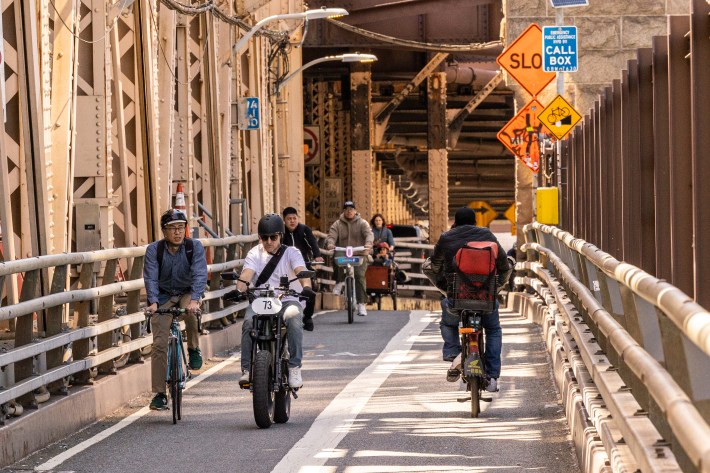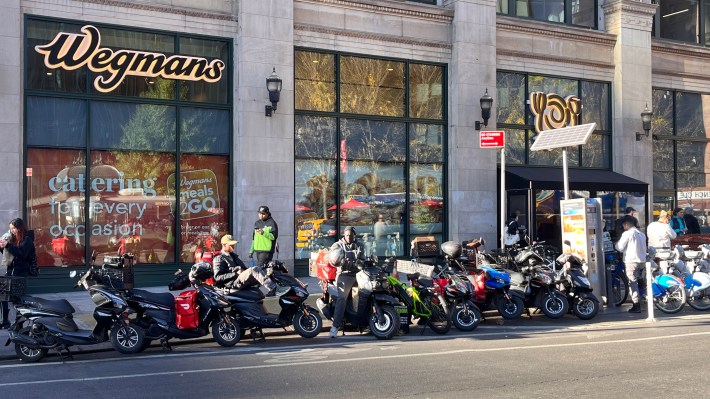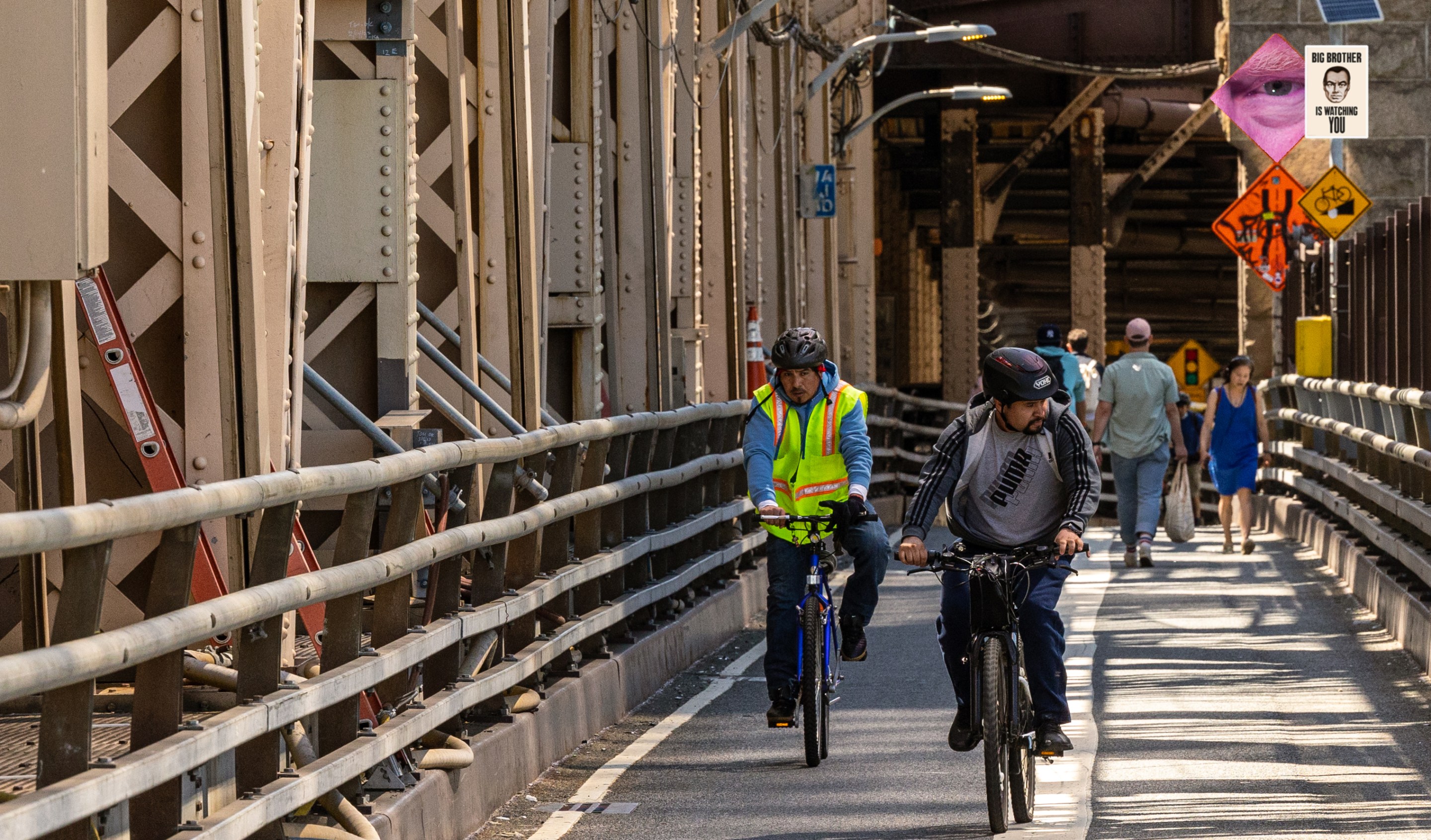It's stop-and-frisk 2.0.
A majority of City Council members wants to require all e-bikes be registered in a new city program, but expert say such a system could lead to a new type of “stop and frisk” aimed at the city's mostly immigrant delivery workforce that is already under threat of deportation by the incoming president.
Not to mention that it won't make the roads safer.
Under Intro 606, the Department of Transportation would have to create a registration system so that "every bicycle with electric assist, electric scooter and other legal motorized vehicle shall be registered with the [DOT] and provided a distinctive identification number and a license plate corresponding to that distinctive identification number." The bill does not specify how the registration would be done, how much it would cost, and whether accessibility devices like motorized wheelchairs would be included.
Council Member Bob Holden introduced the legislation which now has 31 Council members signed on from the 51-member body. Setting aside that data show that e-bikes are not creating a public safety crisis, and that the bill would not address mopeds that operate at higher speeds, civil rights experts say that the law raises serious questions about how it would be enforced.
“This is a bill that has the potential to lead to discriminatory enforcement and application, including against hard-working delivery workers who rely on these e-bikes,” said Michael Sisitzky, assistant policy director at the New York Civil Liberties Union. “And whenever we see those types of new reasons given for law enforcement to engage, it always invites the opportunity for discriminatory application, for profiling people.”

The bill’s is backed by Council members who share Holden’s strong anti-bike views, including Council Member Vickie Paladino (R-Queens), but also some Council Members who have supported bikes in the past, such as Eric Bottcher (D-Manhattan), Chi Ossé (D-Brooklyn), Amanda Farías (D-Bronx), and Julie Menin (D- Manhattan).
Public safety, weaponized

Last week, Speaker Adrienne Adams was asked about the Holden bill and its implications on the safety of immigrants. She declined to address that question, instead parroting the unfounded language used by the bill's proponents – suggesting the streets are dangerous because of e-bikes.
“We know that there is a significant issue when it comes to harm that is being done quite frankly,” Speaker Adams told Streetsblog, without defining the specific issue. “You can walk outside right now and just stand and watch, there is an issue there.”
She also didn't say what one would see "outside right now," but later responded to a different reporter's question with empathy towards New York's immigrants who are currently facing a president-elect who promises to deport millions of immigrants.
“We have historically been, here in New York, a home of immigrant communities who have built this city and I feel that those communities need to be protected,” said Speaker Adams. "Regardless of who is in the White House, we in New York have supported our immigrant communities, which we are all going to continue to do."
Nonetheless, the speaker’s statement about "harm" of micro-mobility echoes what are currently the loudest voices in the room in the debate over how to make roadways safer. The E-Vehicle Safety Alliance, which says its 1,000 members are victims and “potential victims” of e-vehicle violence — has been holding town halls and going to community board meetings all year claiming that e-bikes have made the streets more dangerous than they have ever been, which is not accurate, statistically. Plus, that fear isn't rooted in reality; car drivers, not electric bike riders, are responsible for virtually all pedestrian injuries and deaths.
For instance, in 2024, there were 240 road fatalities through Dec. 3 this year. Of those one was caused by an e-bike rider and another by the rider of a stand-up scooter — or less than 1 percent of the fatalities. Four fatalities were caused by moped or motorcycle riders, who already must have a driver's license, a state-issued license plate and insurance. Car drivers remain the biggest threat to the safety of both pedestrians and e-bike-riding delivery workers, at least 10 of whom have been killed this year alone, Documented reported.
But this pattern of fear and revanchism has played out over and over again.
“Every few years there's some sort of moral panic about some group of people that is making residents feel unsafe. It's hard to take it seriously as a public safety issue,” said Do Lee, an assistant professor of urban studies at Queens College and the author of the report “Delivering Justice.”
Meanwhile, members of the EVSA, as well as some of the bill’s fiercest Council supporters consistently oppose proven safety fixes like protected bike lanes, greenways, congestion pricing, and deliveries by electric cargo bike instead of by truck. Lee says it's because the fears are rooted in a perceived threat, and underlying racism.
“It’s not that they don't feel fear, but feeling fear is not the same as a 'public safety crisis,'" said Lee. "[Intro 606] and these types of laws are Trojan horses for more biased outcomes in policing. It’s this idea of ‘racism without racists’ where you describe something as not being about targeting a certain group but the underlying intention is there. In this case, they say it is about public safety but it actually will lead to targeting. It’s the same playbook."
Supporters call intro 606 "Priscilla's Law," after Priscilla Loke, who was run down and killed by the rider of a Citi Bike, but the bill would not have prevented Loke's death: Citi Bikes are already registered, albeit with Lyft, and the Citi Bike rider who killed her remained on the scene and was questioned by police, who let him go.
“Citi Bikes functionally already meets this [Intro 606] requirement because they're emblazoned with the logo and have the registration number of the bike on them,” said Peter Beadle, a lawyer and e-bike rider from Queens. “This bill, ironically, wouldn't have done anything to change the circumstances that sadly led to the death of Priscilla Loke. What might have had a chance to prevent the death is what we know prevents deaths everywhere, which is to make our streets safer, to stop pedestrians and cyclists from having to fight for the same narrow scraps of road space. Because we're giving most of that space to cars. But of course, the proponents of these bills aren’t interested in this.”
Anti-immigrant sentiment

Streetsblog reached out to all 31 co-sponsors of Intro 606, but only four responded. Council Member Paladino dismissed the notion of discriminatory policing and claimed that “migrant gangs” are using e-bikes to commit crimes.
“I’m not concerned about profiling, I’m concerned about crime. Discriminatory enforcement doesn’t exist. If you’re not using your e-bike or scooter to commit a crime, you have nothing to worry about. Simple as that,” said Paladino. “Let’s take all the money we use on bike lanes and Citi Bike and put it towards implementation of 606.” [Fact check: Taxpayers do not subsidize Citi Bike.]
New York City's "stop and frisk" policy was a cornerstone of the city’s aggressive policing strategies under the Giuliani and Bloomberg administrations. During the height of the practice, more than 600,000 stops were recorded in a single year, disproportionately affecting Black and Latino communities. The practice was deemed unconstitutional by a federal court in the seminal Floyd v. New York ruling in 2013.
The policy's legacy lives on in the city's well-documented history of disproportionate ticketing of pedestrians of color for allegedly crossing against a traffic signal — known to some as "jaywalking." In 2023, of the 463 jaywalking summonses for which race was known, 426 summonses, or 92 percent, were written to Blacks or Latinos, who comprise less than 50 percent of the population.
The Trump effect?
Experts say that a failure to recognize the potential harms of Intro 606 would have disastrous consequences for those same communities the Speaker claims to want to protect.
“As we're heading into an incoming Trump administration, when we know that there is a real desire from the federal government to target immigrant communities, and we know that this is a workforce in New York City with a large number of immigrant New Yorkers among their ranks,” said Sisitzky. "The Council should really rethink whether or not this is the type of environment that we want to be setting up heading into that next administration."
For instance, existing laws about bicycling — such as stopping at red lights or not riding on the sidewalk — target all bike users, citizens and immigrants, or electric bike riders or regular bike riders. But Intro 606 would create a database specifically of electric bike users, the majority of which are immigrants, many of whom are undocumented. Given that President-elect Trump has been clear on his desire to carry out mass deportation, some experts say Intro 606 could delivery him a list.
"It's going to be an attractive source of information for an incoming Trump administration that wants to get data and names and locations of folks who they are going to set their sights on for an aggressive crackdown," said Sisitzky. "We shouldn't be creating new systems that could be tapped into and weaponized."
Advocates who work with immigrant communities are keenly aware of this risk.
"As we face a new Trump administration, the thought of further criminalizing working class people and immigrants of color should give any policy-maker reason to pause," said Luis Cortes, the director of Los Deliveristas Unidos, a group of immigrant delivery workers fighting for labor rights. "Delivery workers already perform one of the most dangerous jobs in the city – they should not be further placed in harm’s way by a bill that will undoubtedly result in the criminalization of their work and lives."
Council Members Francisco Moya (D-Queens), Farías and Ossé said that they signed onto the bill because they want to make the streets safer, but did not directly address how they would ensure that immigrants are not harmed by the legislation.
Moya said he wants legislation that would require liability insurance for micromobility vehicles that reach "dangerous speeds." But mopeds, which make up the vast majority of micro mobility-vehicles that go faster than 20 miles per hour, already are required by state law to be insured and be operated only by people with driver's licenses.
"One of the most-common constituent complaints to my office is the disregard for traffic laws by various assisted micromobility vehicles. I am a cosponsor ... so we can hold bad actors accountable, but still allow the use of micromobility devices," said Moya.






